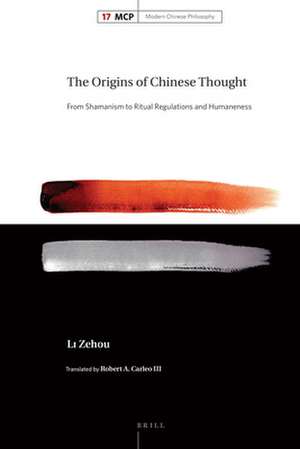The Origins of Chinese Thought: From Shamanism to Ritual Regulations and Humaneness: Modern Chinese Philosophy, cartea 17
Autor Zehou Li Traducere de Robert A. Carleo IIIen Limba Engleză Hardback – 5 sep 2018
"The Origins of Chinese Thought offers an account of the origins and nature of a uniquely Chinese way of thinking that, carried through Confucian tradition, continues to define the character of Chinese culture and society. Li Zehou argues that vestiges of the practices of early shamanistic ritual, rationalized in ritual regulations and internalized in morals and values, continue to shape Chinese thought and relationships. This outlook and its understanding of the world, the divine, ourselves, one another, what is right and what is good differ fundamentally from other world traditions. As an alternative to modern liberalism, it offers unique resources for addressing modern Chinese—and even global—philosophic and moral issues."
Din seria Modern Chinese Philosophy
- 18%
 Preț: 1005.74 lei
Preț: 1005.74 lei - 18%
 Preț: 1072.09 lei
Preț: 1072.09 lei - 18%
 Preț: 787.57 lei
Preț: 787.57 lei - 18%
 Preț: 700.04 lei
Preț: 700.04 lei - 18%
 Preț: 726.69 lei
Preț: 726.69 lei - 18%
 Preț: 1242.50 lei
Preț: 1242.50 lei - 18%
 Preț: 725.07 lei
Preț: 725.07 lei - 18%
 Preț: 939.67 lei
Preț: 939.67 lei - 18%
 Preț: 764.41 lei
Preț: 764.41 lei - 18%
 Preț: 730.40 lei
Preț: 730.40 lei - 18%
 Preț: 816.82 lei
Preț: 816.82 lei - 18%
 Preț: 729.06 lei
Preț: 729.06 lei - 18%
 Preț: 669.74 lei
Preț: 669.74 lei - 18%
 Preț: 699.39 lei
Preț: 699.39 lei - 18%
 Preț: 582.79 lei
Preț: 582.79 lei - 18%
 Preț: 645.66 lei
Preț: 645.66 lei - 18%
 Preț: 792.46 lei
Preț: 792.46 lei - 18%
 Preț: 686.53 lei
Preț: 686.53 lei - 18%
 Preț: 636.54 lei
Preț: 636.54 lei - 18%
 Preț: 685.61 lei
Preț: 685.61 lei - 18%
 Preț: 616.77 lei
Preț: 616.77 lei - 18%
 Preț: 585.94 lei
Preț: 585.94 lei
Preț: 963.22 lei
Preț vechi: 1174.66 lei
-18% Nou
Puncte Express: 1445
Preț estimativ în valută:
184.31€ • 192.92$ • 153.41£
184.31€ • 192.92$ • 153.41£
Carte indisponibilă temporar
Doresc să fiu notificat când acest titlu va fi disponibil:
Se trimite...
Preluare comenzi: 021 569.72.76
Specificații
ISBN-13: 9789004379619
ISBN-10: 9004379614
Dimensiuni: 155 x 235 mm
Greutate: 0.57 kg
Editura: Brill
Colecția Brill
Seria Modern Chinese Philosophy
ISBN-10: 9004379614
Dimensiuni: 155 x 235 mm
Greutate: 0.57 kg
Editura: Brill
Colecția Brill
Seria Modern Chinese Philosophy
Cuprins
Illustrations and Table
Chronology of Selected Works by Li Zehou
Translator’s Introduction
1 On the Shamanistic-Historical Tradition
1 The Unity of Shaman and Ruler
2 The Characteristics of Shamanism
3 From “Shamanism” to “Historicism”
4 “Virtue” and “Ritual”
5 “Humaneness” and “Sincerity”
6 Daoism and the Fundamental Concepts of Chinese Culture
2 Supplement to “On the Shamanistic-Historical Tradition”
1 From Shamanism to Ritual Regulations
2 The Essence of Ritual Regulations: The Integration of Religion, Ethics, and Politics
3 The Way of Heaven and God
3 From Shamanism to Ritual Regulations
1 The Divine in Motion
2 Three Characteristics of “Ritual”
3 Sense of Historical Mission
4 Rooting Ritual Regulations in Humaneness
1 “Emotional Cosmology”
2 “Immanent Transcendence”?
3 “Innate Nature” and “Emotion”: Which is Fundamental?
4 “One-World”
5 Replacing Confucius and Mencius with the Duke of Zhou and Confucius
Appendices
1 The Original Symbols of Chinese Culture
2 On the Integration of Confucianism and Legalism
3 Preliminary Remarks on the Deep Structures of Confucianism
4 Combining Kant and Confucius
Bibliography
Index
Chronology of Selected Works by Li Zehou
Translator’s Introduction
1 On the Shamanistic-Historical Tradition
1 The Unity of Shaman and Ruler
2 The Characteristics of Shamanism
3 From “Shamanism” to “Historicism”
4 “Virtue” and “Ritual”
5 “Humaneness” and “Sincerity”
6 Daoism and the Fundamental Concepts of Chinese Culture
2 Supplement to “On the Shamanistic-Historical Tradition”
1 From Shamanism to Ritual Regulations
2 The Essence of Ritual Regulations: The Integration of Religion, Ethics, and Politics
3 The Way of Heaven and God
3 From Shamanism to Ritual Regulations
1 The Divine in Motion
2 Three Characteristics of “Ritual”
3 Sense of Historical Mission
4 Rooting Ritual Regulations in Humaneness
1 “Emotional Cosmology”
2 “Immanent Transcendence”?
3 “Innate Nature” and “Emotion”: Which is Fundamental?
4 “One-World”
5 Replacing Confucius and Mencius with the Duke of Zhou and Confucius
Appendices
1 The Original Symbols of Chinese Culture
2 On the Integration of Confucianism and Legalism
3 Preliminary Remarks on the Deep Structures of Confucianism
4 Combining Kant and Confucius
Bibliography
Index
Notă biografică
Li Zehou (b. 1930) is a philosopher first famed for his “practical aesthetics” in the 1950s. A leader of China’s 1980s intellectual ferment, Li’s aesthetics, ethics, and intellectual history continue to inspire broad discussion, both public and academic, today.
Robert A. Carleo III – Ph.D. candidate, Philosophy, The Chinese University of Hong Kong. M.Phil. Fudan University, Shanghai. Carleo has translated the work of several contemporary Chinese philosophers, including Li Zehou, Yang Guorong, Chen Lai, and Guo Qiyong.
Robert A. Carleo III – Ph.D. candidate, Philosophy, The Chinese University of Hong Kong. M.Phil. Fudan University, Shanghai. Carleo has translated the work of several contemporary Chinese philosophers, including Li Zehou, Yang Guorong, Chen Lai, and Guo Qiyong.
